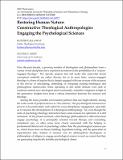Files in this item
Restoring human nature : constructive theological anthropologies engaging the psychological sciences
Item metadata
| dc.contributor.author | Callaway, Kutter | |
| dc.contributor.author | Crisp, Oliver D. | |
| dc.date.accessioned | 2022-05-31T09:30:15Z | |
| dc.date.available | 2022-05-31T09:30:15Z | |
| dc.date.issued | 2022-03-30 | |
| dc.identifier | 279726255 | |
| dc.identifier | 4e54cf79-9dac-4d67-839f-7e781197e5ba | |
| dc.identifier | 85129672325 | |
| dc.identifier.citation | Callaway , K & Crisp , O D 2022 , ' Restoring human nature : constructive theological anthropologies engaging the psychological sciences ' , TheoLogica: An International Journal for Philosophy of Religion and Philosophical Theology , vol. 6 , no. 1 , pp. 1-3 . https://doi.org/10.14428/thl.v6i1.65573 | en |
| dc.identifier.issn | 2593-0265 | |
| dc.identifier.other | Bibtex: Callaway_Crisp_2022 | |
| dc.identifier.other | ORCID: /0000-0001-8866-1548/work/113703206 | |
| dc.identifier.uri | https://hdl.handle.net/10023/25471 | |
| dc.description.abstract | Over the past decade, a growing number of theologians and philosophers from a variety of sub disciplines have expressed an interest in the possibilities of a “science-engaged theology.” The specific projects that fall under this somewhat broad conceptual umbrella are rather diverse, but at its most basic, science-engaged theology is a form of inquiry that is deeply engaged with one or more of the sciences in the service of articulating, defending, or critiquing existing theological and philosophical frameworks. Some operating in this fertile domain even seek to construct entirely new theological (and occasionally, scientific) categories in light of the generative insights born from a robust interaction between the sciences and theology. | |
| dc.format.extent | 3 | |
| dc.format.extent | 223569 | |
| dc.language.iso | eng | |
| dc.relation.ispartof | TheoLogica: An International Journal for Philosophy of Religion and Philosophical Theology | en |
| dc.subject | BL Religion | en |
| dc.subject | BF Psychology | en |
| dc.subject | T-NDAS | en |
| dc.subject | AC | en |
| dc.subject | NCAD | en |
| dc.subject | MCC | en |
| dc.subject.lcc | BL | en |
| dc.subject.lcc | BF | en |
| dc.title | Restoring human nature : constructive theological anthropologies engaging the psychological sciences | en |
| dc.type | Journal article | en |
| dc.contributor.institution | University of St Andrews. School of Divinity | en |
| dc.identifier.doi | 10.14428/thl.v6i1.65573 | |
| dc.description.status | Peer reviewed | en |
This item appears in the following Collection(s)
Items in the St Andrews Research Repository are protected by copyright, with all rights reserved, unless otherwise indicated.

